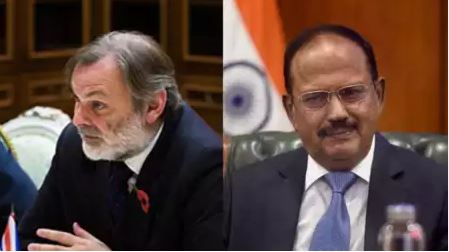The meeting between the NSAs comes in the wake of threats from Khalistani separatists who, apparently, issued posters giving photos and names of Indian diplomats under a ‘Kill India’ banner.
India and the United Kingdom have agreed to enhance cooperation to address violent extremism and radicalization. The two countries also discussed the growing security situation in Russia and the ongoing war in Ukraine.
The agreement was reached during a meeting between Indian National Security Advisor (NSA) Ajit Doval and his British counterpart, Tim Barrow, in New Delhi on Friday.
Doval raised the issue of Khalistani elements operating in the UK and asked Barrow to take action against them, either by deporting them or by prosecuting them. He said that Khalistani elements are a threat to India’s security and that they have been involved in planning and executing terrorist attacks.
Barrow said that the UK takes the issue of terrorism very seriously and that he will look into the matter. He also said that the UK government is committed to working with India to counter-terrorism.
In addition to discussing security issues, the two NSAs also discussed the growing security situation in Russia and the ongoing war in Ukraine. Doval said that India is collating inputs on how to effectively deal with the matter now that it will be hosting the G20 Summit in India in the next two months.
Delegation-level talks were also held between both sides in order to “reaffirm the close strategic partnership” between India and the UK. Sources added that both sides “agreed to accord maximum priority to further enhance the security linkages.”
Both sides agreed to work closely on counter-terrorism, counter-terror financing, the use of the internet for terrorism purposes, illicit drug trafficking, and counter-radicalization.
During the talks, the NSAs decided to deepen collaboration in critical and emerging technologies.
Overall, the meeting between Doval and Barrow was a positive step in strengthening the security cooperation between India and the UK. The two countries agreed to work together to address a range of security challenges, including terrorism, radicalization, and the use of technology for malicious purposes.






















